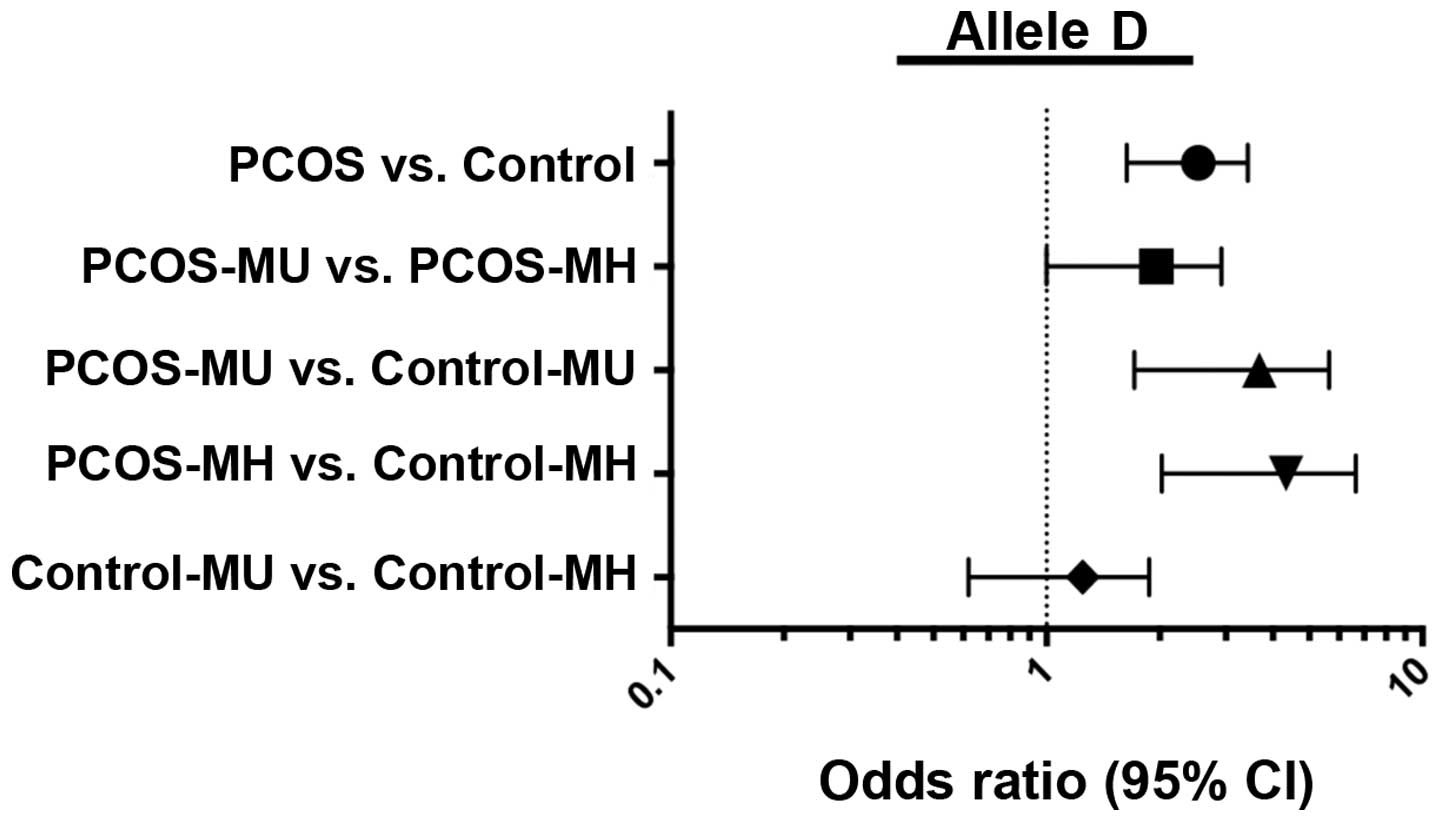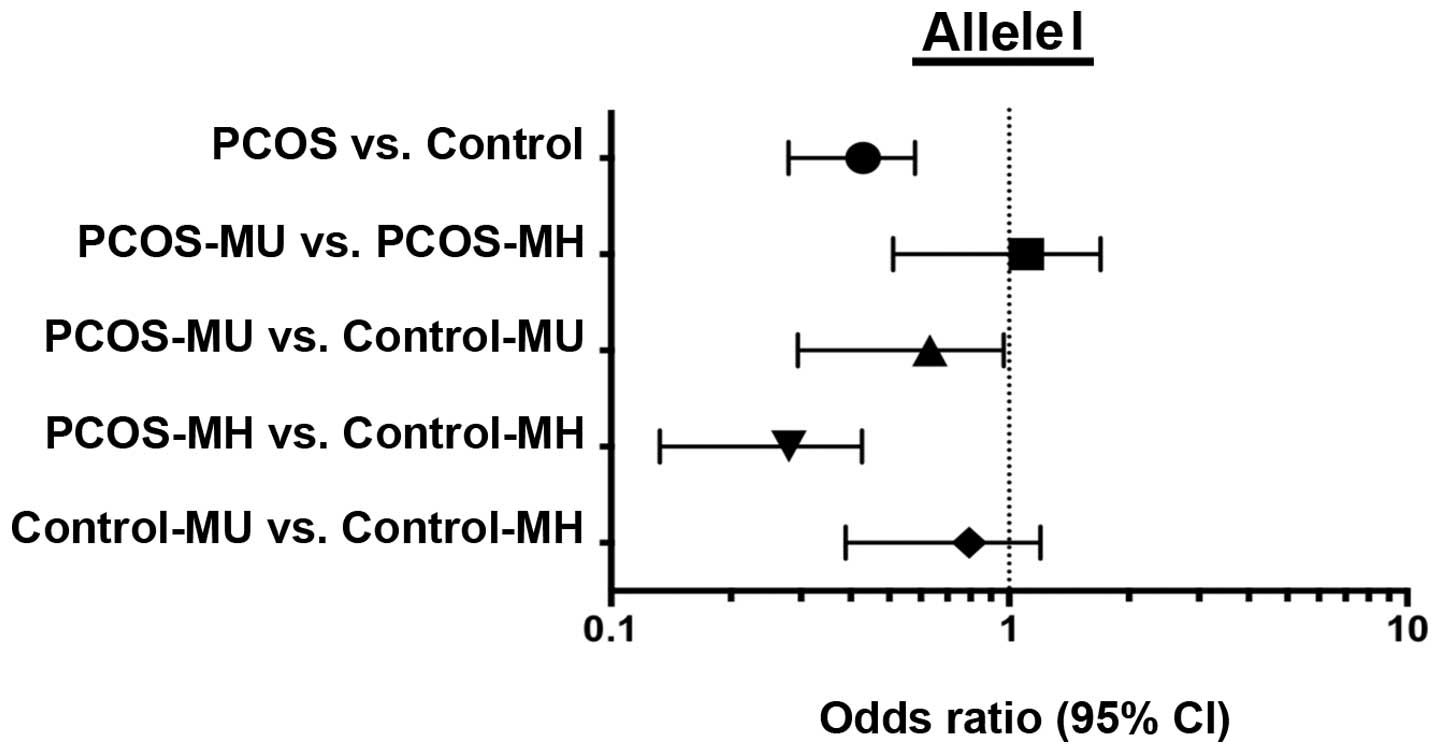|
1
|
Yoshimura Y: The ovarian renin-angiotensin
system in reproductive physiology. Front Neuroendocrinol.
18:247–291. 1997. View Article : Google Scholar : PubMed/NCBI
|
|
2
|
Van Sande ME, Scharpé SL, Neels HM and Van
Camp KO: Distribution of angiotensin converting enzyme in human
tissues. Clin Chim Acta. 147:255–260. 1985. View Article : Google Scholar : PubMed/NCBI
|
|
3
|
Soubrier F, Wei L, Hubert C, Clauser E,
Alhenc-Gelas F and Corvol P: Molecular biology of the angiotensin I
converting enzyme: II. Structure-function. Gene polymorphism and
clinical implications. J Hypertens. 11:599–604. 1993. View Article : Google Scholar : PubMed/NCBI
|
|
4
|
Palumbo A, Pourmotabbed G, Carcangiu ML,
Andrade-Gordon P, Roa L, DeCherney A and Naftolin F:
Immunohistochemical localization of renin and angiotensin in the
ovary: Comparison between normal women and patients with
histologically proven polycystic ovarian disease. Fertil Steril.
60:280–284. 1993. View Article : Google Scholar : PubMed/NCBI
|
|
5
|
Johnson MC, Vega M, Vantman D, Troncoso JL
and Devoto L: Regulatory role of angiotensin II on progesterone
production by cultured human granulosa cells. Expression of
angiotensin II type-2 receptor. Mol Hum Reprod. 3:663–668. 1997.
View Article : Google Scholar : PubMed/NCBI
|
|
6
|
Plendl J, Neumüller C, Vollmar A, Auerbach
R and Sinowatz F: Isolation and characterization of endothelial
cells from different organs of fetal pigs. Anat Embryol (Berl).
194:445–456. 1996. View Article : Google Scholar : PubMed/NCBI
|
|
7
|
Acosta TJ, Berisha B, Ozawa T, Sato K,
Schams D and Miyamoto A: Evidence for a local
endothelin-angiotensin-atrial natriuretic peptide systemin bovine
mature follicles in vitro: Effects on steroid hormones and
prostaglandin secretion. Biol Reprod. 61:1419–1425. 1999.
View Article : Google Scholar : PubMed/NCBI
|
|
8
|
Stefanello JR, Barreta MH, Porciuncula PM,
Arruda JN, Oliveira JF, Oliveira MA and Gonçalves PB: Effect of
angiotensin II with follicle cells and insulin-like growth factor-I
or insulin on bovine oocyte maturation and embryo development.
Theriogenology. 66:2068–2076. 2006. View Article : Google Scholar : PubMed/NCBI
|
|
9
|
Nielsen AH, Hagemann A, Svenstrup B,
Nielsen J and Poulsen K: Angiotensin II receptor density in bovine
ovarian follicles relates to tissue renin and follicular size. Clin
Exp Pharmacol Physiol. 21:463–469. 1994. View Article : Google Scholar : PubMed/NCBI
|
|
10
|
Azziz R, Carmina E, Dewailly D,
Diamanti-Kandarakis E, Escobar-Morreale HF, Futterweit W, Janssen
OE, Legro RS, Norman RJ, Taylor AE, et al: The androgen excess and
PCOS society criteria for the polycystic ovary syndrome: The
complete task force report. Fertil Steril. 91:456–488. 2009.
View Article : Google Scholar : PubMed/NCBI
|
|
11
|
Diamanti-Kandarakis E: Polycystic ovarian
syndrome: Pathophysiology, molecular aspects and clinical
implications. Expert Rev Mol Med. 10:e32008. View Article : Google Scholar : PubMed/NCBI
|
|
12
|
Cho LW, Randeva HS and Atkin SL:
Cardiometabolic aspects of polycystic ovarian syndrome. Vasc Health
Risk Manag. 3:55–63. 2007.PubMed/NCBI
|
|
13
|
Diamanti-Kandarakis E, Piperi C, Spina J,
Argyrakopoulou G, Papanastasiou L, Bergiele A and Panidis D:
Polycystic ovary syndrome: The influence of environmental and
genetic factors. Hormones (Athens). 5:17–34. 2006. View Article : Google Scholar : PubMed/NCBI
|
|
14
|
Pérez MS, Cerrone GE, Benencia H, Márquez
N, De Piano E and Frechtel GD: Polymorphism in CYP11alpha and CYP17
genes and the etiology of hyperandrogenism in patients with
polycystic ovary syndrome. Medicina (B Aires). 68:129–134. 2008.(In
Spanish). PubMed/NCBI
|
|
15
|
Mlinar B, Pfeifer M, Vrtacnik-Bokal E,
Jensterle M and Marc J: Decreased lipin 1 beta expression in
visceral adipose tissue is associated with insulin resistance in
polycystic ovary syndrome. Eur J Endocrinol. 159:833–839. 2008.
View Article : Google Scholar : PubMed/NCBI
|
|
16
|
Christopoulos P, Mastorakos G, Gazouli M,
Panidis D, Deligeoroglou E, Katsikis I, Papadias K,
Diamandi-Kandarakis E and Creatsas G: Genetic variants in TCF7L2
and KCNJ11 genes in a Greek population with polycystic ovary
syndrome. Gynecol Endocrinol. 24:486–490. 2008. View Article : Google Scholar : PubMed/NCBI
|
|
17
|
Giacchetti G, Sechi LA, Rilli S and Carey
RM: The renin-angiotensin-aldosterone system, glucose metabolism
and diabetes. Trends Endocrinol Metab. 16:120–126. 2005. View Article : Google Scholar : PubMed/NCBI
|
|
18
|
Rigat B, Hubert C, Alhenc-Gelas F, Cambien
F, Corvol P and Soubrier F: An insertion/deletion polymorphism in
the angiotensin I-converting enzyme gene accounting for half the
variance of serum enzyme levels. J Clin Invest. 86:1343–1346. 1990.
View Article : Google Scholar : PubMed/NCBI
|
|
19
|
Sun J, Fan H, Che Y, Cao Y, Wu X, Sun HX,
Liang F, Yi L and Wang Y: Association between ACE gene I/D
polymorphisms and hyperandrogenism in women with polycystic ovary
syndrome (PCOS) and controls. BMC Med Genet. 10:642009. View Article : Google Scholar : PubMed/NCBI
|
|
20
|
Celik O, Yesilada E, Hascalik S, Celik N,
Sahin I, Keskin L and Ozerol E: Angiotensin-converting enzyme gene
polymorphism and risk of insulin resistance in PCOS. Reprod Biomed
Online. 20:492–498. 2010. View Article : Google Scholar : PubMed/NCBI
|
|
21
|
Karabulut A, Turgut S and Turgut G:
Angiotensin converting enzyme gene insertion/deletion polymorphism
in patients with polycystic ovary syndrome. Gynecol Endocrinol.
26:393–398. 2010. View Article : Google Scholar : PubMed/NCBI
|
|
22
|
Amsterdam ESHRE/ASRM-Sponsored 3rd PCOS
Consensus Workshop Group, . Consensus on women's health aspects of
polycystic ovary syndrome (PCOS). Hum Reprod. 27:14–24. 2012.
View Article : Google Scholar : PubMed/NCBI
|
|
23
|
Ferriman D and Gallwey JD: Clinical
Assessment of body hair growth in women. J Clin Endocrinol Metab.
21:1440–1447. 1961. View Article : Google Scholar : PubMed/NCBI
|
|
24
|
Amato MC, Guarnotta V, Forti D, Donatelli
M, Dolcimascolo S and Giordano C: Metabolically healthy polycystic
ovary syndrome (MH-PCOS) and metabolically unhealthy polycystic
ovary syndrome (MU-PCOS): A comparative analysis of four simple
methods useful for metabolic assessment. Hum Reprod. 28:1919–1928.
2013. View Article : Google Scholar : PubMed/NCBI
|
|
25
|
Grundy SM, Cleeman JI, Daniels SR, Donato
KA, Eckel RH, Franklin BA, Gordon DJ, Krauss RM, Savage PJ, Smith
SC Jr, et al: Diagnosis and management of the metabolic syndrome:
An American heart association/national heart, lung and blood
institute scientific statement. Circulation. 112:2735–2752. 2005.
View Article : Google Scholar : PubMed/NCBI
|
|
26
|
Obesity, . Preventing and managing the
global epidemic. Report of a WHO consultation. World Health Organ
Tech Rep Ser. 894:i-xii.1–253. 2000.
|
|
27
|
Amato MC, Giordano C, Galia M, Criscimanna
A, Vitabile S, Midiri M and Galluzzo A: AlkaMeSy Study Group:
Visceral adiposity index: A reliable indicator of visceral fat
function associated with cardiometabolic risk. Diabetes Care.
33:920–922. 2010. View Article : Google Scholar : PubMed/NCBI
|
|
28
|
Ueda S, Heeley RP, Lees KR, Elliott HL and
Connell JM: Mistyping of the human angiotensin-converting enzyme
gene polymorphism: Frequency, causes and possible methods to avoid
errors in typing. J Mol Endocrinol. 17:27–30. 1996. View Article : Google Scholar : PubMed/NCBI
|
|
29
|
Apridonidze T, Essah PA, Iuorno MJ and
Nestler JE: Prevalence and characteristics of the metabolic
syndrome in women with polycystic ovary syndrome. J Clin Endocrinol
Metab. 90:1929–1935. 2005. View Article : Google Scholar : PubMed/NCBI
|
|
30
|
Ford ES, Giles WH and Dietz WH: Prevalence
of the metabolic syndrome among US adults: Findings from the third
national health and nutrition examination survey. JAMA.
287:356–359. 2002. View Article : Google Scholar : PubMed/NCBI
|
|
31
|
Chen MJ, Yang WS, Yang JH, Chen CL, Ho HN
and Yang YS: Relationship between androgen levels and blood
pressure in young women with polycystic ovary syndrome.
Hypertension. 49:1442–1447. 2007. View Article : Google Scholar : PubMed/NCBI
|
|
32
|
Legro RS, Urbanek M, Kunselman AR, Leiby
BE and Dunaif A: Self-selected women with polycystic ovary syndrome
are reproductively and metabolically abnormal and undertreated.
Fertil Steril. 78:51–57. 2002. View Article : Google Scholar : PubMed/NCBI
|
|
33
|
Cardoso RL, Nogueira AR, Salis LH, Urményi
TP, Silva R, Moura-Neto RS, Pereira BB, Rondinelli E and Souza e
Silva NA: The association of ACE gene D/I polymorphism with
cardiovascular risk factors in a population from Rio de Janeiro.
Braz J Med Biol Res. 41:512–518. 2008. View Article : Google Scholar : PubMed/NCBI
|
|
34
|
Feig JE, Hewing B, Smith JD, Hazen SL and
Fisher EA: High-density lipoprotein and atherosclerosis regression:
Evidence from preclinical and clinical studies. Circ Res.
114:205–213. 2014. View Article : Google Scholar : PubMed/NCBI
|
|
35
|
Deepika ML, Reddy KR, Rani VU, Balakrishna
N, Latha KP and Jahan P: Do ACE I/D gene polymorphism serve as a
predictive marker for age at onset in PCOS? J Assist Reprod Genet.
30:125–130. 2013. View Article : Google Scholar : PubMed/NCBI
|
















